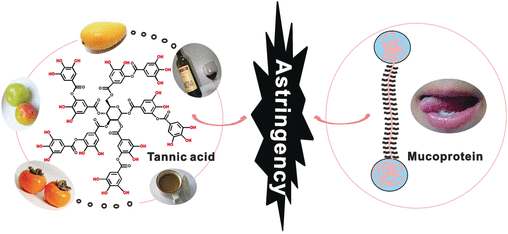Astringent mouthfeel of wine results from a lubrication failure in the mouth

We are all familiar with that strange feeling in the mouth after a sip of red wine or tea, or a bite of unripe fruit. It has been described as dry, leathery, or even furry. This astringent effect is caused by tannins or polyphenolic compounds that bind to mucins, lubricating proteins in the mucus membranes of the mouth. In the journal Angewandte Chemie, a Chinese and Korean research team has now shown the relationship between astringency and disrupted lubrication of the oral cavity.
Mucins consist of a central protein chain with side chains made of sugar compounds that can bind a large amount of water. Mucins form a barrier and protect sensitive mucus membranes from drying out and from chemical and mechanical interactions. They provide adequate lubrication and correspondingly low friction. This lubricating film in the oral cavity fails when tannins get into the act: a sip of wine causes the tongue to feel less slippery.
This friction aspect has now been more closely studied by a team working with Feng Zhou. The scientists from the Chinese Academy of Sciences (Lanzhou, China) and the Korea Advanced Institute of Science and Technology (KAIST, Daejeon, Republic of Korea) used a dumbbell-shaped mucin extracted from oral mucus membranes and tannic acid, a star-shaped polyphenol found in wine and unripe fruit, as their tannin. When the tannic acid binds to the mucin, their interactions reduce the solubility of the protein in water. The mucins consequently aggregate and may precipitate, leading to a failure of the mucin lubrication film.
The quartz crystal microbalance (QCM) technique was employed for monitoring adsorption and precipitation of proteins induced by tannic acid molecules. Atomic force microscopy of a substrate coated in mucin showed a flat, dense, film. After addition of tannic acid, many "defects" could be seen in the film and the surface was significantly rougher.
The researchers determined the friction between a soft plastic ball and a glass surface coated with mucin. In comparison to a surface coated only with water, the mucin-coated surface had much lower friction. Addition of tannic acid caused the friction to rise substantially. An extract of coffee beans, which also contain tannins, had a similar effect.
In order to mimic a tongue, the scientists produced a mucin-containing plastic hydrogel. When wet, this elastic but barely tear-resistant material had very low friction, slipping easily through the fingers. A weight placed on an inclined surface of this hydrogel slides right off. Addition of a tannic acid solution makes the gel sticky and it begins to shrink as a result of losing water. The mechanical strength increases significantly and the elasticity decreases. The weight no longer slides off.
Bioactive proteins that maintain the slippery state of fish skin also react to tannins. The researchers made gloves that release tannic acid when touched. These gloves made it easy to grasp and hold fish.
More information: Shuanhong Ma et al. Astringent Mouthfeel as a Consequence of Lubrication Failure, Angewandte Chemie International Edition (2016). DOI: 10.1002/anie.201601667
Journal information: Angewandte Chemie International Edition , Angewandte Chemie
Provided by Wiley




















